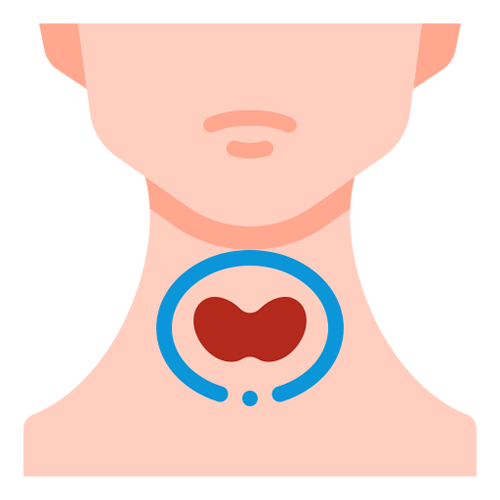No products in the basket.
Hypothyroidism
Hypothyroidism, also known as an underactive thyroid, is a common condition where the thyroid gland does not produce enough essential hormones to meet the body’s needs. The thyroid gland, located in the neck, plays a crucial role in regulating energy levels, metabolism, and various other vital body functions. When the thyroid underperforms, it can lead to a range of symptoms that affect your daily life and overall well-being.

Hypothyroidism
Fortunately, hypothyroidism is a manageable condition. With the right treatment and lifestyle adjustments, you can regain balance and live a healthy, fulfilling life.
What is Hypothyroidism?
When the thyroid gland does not produce enough thyroid hormones, especially thyroxine (T4) and triiodothyronine (T3), hypothyroidism results. These hormones control the body’s metabolic rate, which impacts our weight, energy levels, and organ function in general.
An underactive thyroid can develop due to several reasons, including autoimmune conditions like Hashimoto’s thyroiditis, iodine deficiency, certain medications, or as a result of thyroid surgery. Left untreated, hypothyroidism can lead to serious complications, such as heart disease, infertility, and myxedema, a rare but life-threatening condition.
Common Symptoms of Hypothyroidism
The symptoms of hypothyroidism can vary depending on the severity of the condition. People often mistake them for other health issues as they develop slowly over time. Common symptoms include:
- Fatigue and low energy
- Despite not changing my diet or exercise routine, I have gained weight.
- Sensitivity to cold temperatures
- Dry skin and brittle hair
- Depression or low mood
- Constipation
- Symptoms include a puffy face and swelling in the hands or feet.
- Hoarseness
- Slow heart rate
If you experience these symptoms, it’s important to consult a healthcare professional.
Causes and Risk Factors
Several factors can contribute to the development of hypothyroidism.
- The most common cause of autoimmune diseases is Hashimoto’s thyroiditis. It occurs when the immune system attacks the thyroid gland.
- Iodine Deficiency: Iodine is crucial for thyroid hormone production, and a deficiency can lead to an underactive thyroid.
- Thyroid Surgery: Partial or total removal of the thyroid gland can result in hypothyroidism.
- Radiation Therapy: Radiation treatment to the neck or head can damage the thyroid gland.
- Medications: Certain drugs, such as lithium, can interfere with thyroid hormone production.
Certain individuals, such as women, those over 60, and those with a family history of thyroid disorders, are more susceptible.
Diagnosing Hypothyroidism
Hypothyroidism is typically diagnosed through a blood test that measures levels of Thyroid Stimulating Hormone (TSH) and thyroxine (T4). High levels of TSH and low levels of T4 are indicative of an underactive thyroid.
Your doctor may also evaluate your medical history and perform a physical exam to check for signs like swelling in the thyroid (goitre) or dry skin. Early diagnosis is key to effective management.
Managing Hypothyroidism
Treatment and lifestyle adjustments can effectively manage hypothyroidism, despite its chronic nature. The primary treatment involves hormone replacement therapy, which helps restore normal hormone levels.
Hormone Replacement Therapy
The most common treatment for hypothyroidism is levothyroxine, a synthetic form of thyroxine (T4). Taken daily, this medication helps normalise hormone levels and alleviates symptoms. Regular blood tests are necessary to ensure the dosage is correct and to monitor your thyroid function over time.
Diet and Nutrition
While diet alone cannot treat hypothyroidism, certain nutrients play a supportive role in thyroid health. Foods rich in iodine, selenium, and zinc, such as fish, eggs, nuts, and whole grains, can benefit the thyroid. However, it’s essential to avoid excessive iodine intake, as it can worsen thyroid dysfunction.
Exercise and Lifestyle
Engaging in regular physical activity can help combat fatigue, maintain a healthy weight, and boost mood. Low-impact exercises like walking, yoga, and swimming are particularly beneficial. Managing stress through mindfulness, meditation, or relaxation techniques can also improve overall well-being.
Regular Monitoring
Hypothyroidism requires ongoing care and monitoring to ensure treatment remains effective. Keep up with regular appointments to adjust medication dosage as needed and to monitor for any potential complications.
Living Well with Hypothyroidism
Living with hypothyroidism requires some adjustments, but with the right approach, you can lead a normal, healthy life. Take an active role in your care by following your treatment plan, maintaining a balanced diet, and focusing on self-care.
Support groups, whether in person or online, can provide valuable encouragement and a sense of community. Connecting with others who understand your experience can help you feel less alone in managing the condition.
Remember, hypothyroidism is manageable, and many people with the condition go on to live happy, fulfilling lives.
When to Seek Help
If you notice symptoms of hypothyroidism or if your existing symptoms worsen, don’t hesitate to seek medical advice. Early intervention can make a significant difference in preventing complications and improving your overall health.
Your healthcare team is there to provide guidance and support, helping you navigate the journey to better thyroid health. With the right care, hypothyroidism doesn’t have to hold you back from living the life you want.
No products were found matching your selection.
